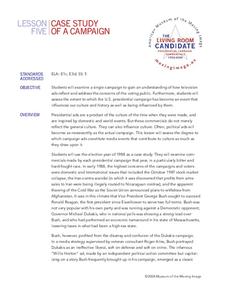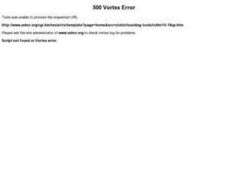Curated OER
Bridging the gap between the U.S. and Cuba
Eleventh graders examine the events that led to the strained relationship between Cuba and the United States. In this US History lesson, 11th graders create an illustrated timeline of Cuba-U.S. relations. Students write an...
Curated OER
South Carolina Voices: Lessons from the Holocaust
Students take a closer look at life in concentration camps. In this Holocaust lesson, students listen to their instructor tell the stories of 3 Holocaust survivors and discuss the effects that victims experienced after the war
Curated OER
Debating the bomb
Students research how the development of the atomic bomb affected people in World War II. In this American History lesson, students participate in a debate about the bombs use. Students investigate how it has affected...
Foreign Policy Research Institute
Understanding the Koreas
Though this resource was designed in 2005, US tension with North Korea remains a relevant topic for exploration and understanding. Unfortunately, this lecture and reading-based instructional activity is unlikely to engage the class. The...
Curated OER
Case Study of a Campaign
Students read a case study of one campaign to discover how political campaigns addresses the needs of the voters. In groups, they answer questions related to the case and discuss how the commercials affect society as a whole. They use...
Harry S. Truman Library & Museum
Marshall Plan: Convince the American People
This is an excellent resource for US history classes, especially AP history. After learning some background on the Marshall Plan, the class, divided into two groups, researches opposing positions on this aid program. Groups read and...
Curated OER
Debating the Bomb
Students research the repercussions of the development of the atomic bomb. In this history lesson plan, students read, reflect and discuss nuclear warfare and how it affected the population when it was introduced, as well as how it...
Curated OER
Human Rights And Refugees: The Right To Asylum
High schoolers read the Universal Declaration of Human Rights, define asylum and identify when people have the right to asylum. They examine specific cases of asylum in recent times and consider some of the difficulties refugees face.
Curated OER
The Role of Government
Students are introduced to the economic roles of the federal government. Using the internet, they read information related to government spending and the actual dollar amounts attached to budget items. In groups, they develop their own...
Curated OER
Compare and Contrast Timelines of the World
Seventh graders create a classroom timeline of important world events. This activity is meant to be used during the entire school year. As the school year goes along, events are added to the timeline as chosen by the class. The events...
Curated OER
Immigrants Welcome?
Ninth graders examine the world after the end of World War II. In groups, they complete a Naturalization Review Board activity and discuss how immigrants changed the United States. As a class, they discover how the immigration policies...
Curated OER
Consumer Culture in the 1950s: New Shopping Centers and Advertising trends
Eleventh graders analyze the cultural and social aspects of the 1950s. Using primary source documents, they work together to determine what society was like. They use that information to write an essay about how their information...
Curated OER
Weather Anomalies
Ninth graders participate in a simulation of a select scientific team from the National Oceanic and Atmospheric Administration (NOAA).
Curated OER
Fidel Castro: El Comandante
Students view a documentary on Fidel Castro. After nearly forty years of rule, he remains one of the most controversial political figures of the twentieth century. After viewing, students discuss what they saw and research the Cuban...
Curated OER
Debating the Bomb
Students research how the development of the atomic bomb affected people in World War II, participate in a debate about the bomb's use, and investigate how it has affected people's lives since 1945.
Curated OER
The U.S. Trade Embargo on Cuba
Students examine perspectives for and against the U.S. trade embargo on Cuba, develop a position on the embargo and articulate viewpoints in a public forum.
Curated OER
Poisoned Chalice
Students explore espionage. In this current events lesson, students research various Web sites for information about the history of spy work, Anglo-Russian relations, and spy gadgets.
Curated OER
Declaration of Power
Students examine the Korean nuclear escalation. In this current events lesson, students explore the nuclear arms race in Korea and the science that explains nuclear weapons.
Curated OER
The Inauguration of Barack Obama the 44th President of the United States
Eleventh graders explore the process of inauguration in the United States. Students describe the symbolic and political significance of the ceremony of the inauguration of the President of the United States. Students role...
Curated OER
Vietnam: A Divided Nation
Eleventh graders examine events leading up to and during the Vietnam War. They research assigned topics utilizing interviews, Powerpoint presentations, timelines, and collages in their presentations.
Curated OER
Economic Systems
Learners examine and identify the different economic systems throughout the world. In groups, they develop their own economy basd on their own values and principles. They are given a problem scenerio to solve with the components of...
Curated OER
Cuban Missile Crisis
Seventh graders explore, analyze and study all the various aspects that happened concerning the Cuban Missile Crisis. They assess documents from the Cuban Missile Crisis and make decisions about what the United States should do based on...
Curated OER
Aurora Borealis
Students read background information about the Aurora Borealis and complete a science experiment based on the lights. In this Aurora Borealis lesson, students read information about the formation and background of the Aurora Borealis....
John F. Kennedy Presidential Library & Museum
Analyzing the Inaugural Address
Get high school historians to step outside their own shoes by responding to JFK's inaugural address from the perspective of a civil rights activist, a soviet diplomat, or a Cuban exile. After a class discussion about the address,...

























